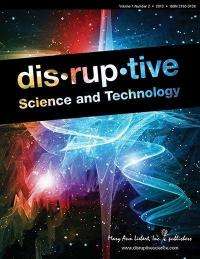Embracing debate on how cancers develop: Without the answer, effective therapies remain elusive

Scientists invariably conduct debates in private about whether a body of scientific work or thought is worthy of presentation to the community. Behind closed doors scientists and editors tussle over when is the right time to publish their work. In a disruptive departure from this norm, Disruptive Science and Technology, a peer-reviewed journal from Mary Ann Liebert, Inc. publishers, has launched a Debate section in which ideas and counterpoints can be debated in public. The Journal seeks not to sway opinions but rather to inform them. It is fitting that the first series of debates is focused on the root cause of cancer.
Most cancer researchers would likely agree that not understanding how cancer develops is a major obstacle in the ongoing "war on cancer." However, in some scientists' minds the mechanism that underlies tumor development is not settled science. Under the Somatic Mutation Theory, cancers arise as a consequence of changes to DNA, while the Tissue Organization Field Theory states that they result from disruptions in normal cell communication needed to correctly form tissues. The initial debate explores these two major theories of cancer development in Disruptive Science and Technology, and the articles are available free on the Journal website at http://www.liebertpub.com/dst.
Stuart Baker, ScD, National Cancer Institute (Bethesda, MD), initiates the debate with the article, "Paradoxes in Carcinogenesis Should Spur New Avenues of Research: An Historical Perspective." Dr. Baker describes "paradigm instability" between the two main explanations of how cancer develops— the more the dominant theory is investigated without a conclusive resolution, the more proponents think they are getting closer to understanding and the more others think the evidence is pointing to an alternative theory. Dr. Baker discusses paradoxes— experimental and observational results that are not fully explained by one theory but which make sense under the other. He proposes focusing more research on explaining these paradoxes.
Vincent Wilson, PhD, Louisiana State University (Baton Rouge, LA), emphasizes that cancer develops as a result of both genetic and environmental factors in "Carcinogenesis as the Sum of Its Parts." Regardless of the specific causative event, multiple changes are required for an individual cancer cell and a tumor to develop. He suggests either combining the two main proposals for the mechanism of carcinogenesis, or subdividing cancer into subgroups developing specific hypotheses to explain the cause of each type.
Eric Lagasse, PharmD, PhD, University of Pittsburgh School of Medicine (PA), argues in "Battling Cancer: In the End What Matters the Most?" that while the initial event resulting in cancer is not yet clear, pointing out yet another cancer formation theory (Cancer Stem Cell Theory), cancer treatment can be improved by tailoring therapy to target the genetic characteristics of a patient's most aggressive tumor cells and to continue to monitor and modify treatment as needed to overcome drug resistance.
"The mechanisms underlying cancer formation are complex and not completely understood, even after some victories in the 'war on cancer,'" says Editor-in-Chief Alan J. Russell, PhD, Highmark Distinguished Career Professor, Carnegie Mellon University, Pittsburgh, PA. "Drs. Baker, Wilson, and Lagasse present different points of view as to the most likely explanations for carcinogenesis. A deeper understanding of cancer mechanisms is important for designing therapeutics and formulating new research questions."













